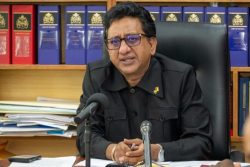One of the things which makes Guyana such a challenge for any newcomer is the absence of civility. At the simplest level even the common courtesies often seem to be in abeyance now, with people making demands on others without recourse to those expressions of politeness which supply the unguent for frictionless human interaction. Courtesies are a way of acknowledging the humanity of the other person, and are not just superfluous formalities.
Of course, young people particularly are more distracted than they used to be, with their eyes invariably glued to their iphone screens, sparing little time for the exchanges which go on in the real world involving real human beings. But still, that is not the origin of the problem; it is simply a more recent exacerbating factor. Go into any store, and many of the clerks (albeit not all) simply appear not to know how to address customers any longer; or stop a taxi on the road and some of the drivers will hardly put themselves out to be mannerly. And as for the mini-bus drivers and conductors, it is no news to anyone that they are a law unto themselves, operating in an entirely alien social universe from the rest of us.
Owing to the fact that this country has become what is routinely referred to as a lawless society, where the laws are broken with impunity, the rules are transgressed with regularity, and the conventions which govern social contact are habitually ignored, people do not have respect for anyone else. They do what they want, and when they come into conflict with someone, a Thrasymachus principle comes into play, ie might is right. (The local variant on this is wrong and strong.) In such a society it is hardly surprising that civility has disappeared along with the observance of official behavioural prescriptions.
If a stranger were to drive on the road on any given day, he would come to the conclusion that this was a nation without traffic regulations. In fact, one suspects that this society has invented a whole class of potential traffic offences unknown elsewhere on the planet, the most recent being ‘undertaking’. It is not just that the traffic laws are honoured in the breach, however; it is also that so many drivers operate as if they have contempt for other drivers. The little courtesies on the road which one might witness in another country, for example, are for the most part absent here. The fact that people’s lives are at stake, does not seem to trouble any among our army of road hogs, particularly the minibus drivers whose consuming motivation in life appears to be to get ahead of everyone else no matter what the human cost.
But it is not just on the roadways that civility has disappeared; even in the sanctity of people’s homes the problem becomes apparent. There are so many areas where residents are assaulted by unwanted noise emanating from beer gardens, passing minibuses, music carts and even their neighbours, among others. It doesn’t matter to the player that music above a certain decibel level is harmful to hearing; or that it puts other people under stress, or makes it impossible for them to hear their TVs or carry on a conversation; or that it aggravates certain medical conditions; or that it causes distress to the old; or that it prevents children from doing their homework ‒ all that is secondary to the perpetrator’s own enjoyment.
At least one of the nineteenth century writers had plenty to say about this, which perhaps could be distilled rather simply as, you should have as much freedom as possible as long as it does not impinge on anyone else’s freedom. All that can be said is that a lot of impinging on other people’s freedom goes on here.
Of course in the case of the traffic breaches and noise nuisance there are actual laws on the statute books, and their systematic enforcement would probably have the effect of restoring some of the civilities on the road which are not actually legislated for, but which are extended out of respect for others. The problem is that this is a country of campaigns; there will be a ferocious campaign – or not so ferocious, as the case may be – which lasts for a brief space, following which everything returns to the status quo ante. Nothing is sustained – like the tinted car windows campaign. The latest news of this kind which has come to citizens’ attention has been the formation of an official noise nuisance committee or group. The cynical among us will roll their eyes in weariness, since we have been down this road before, and nothing ever eventuated in the longer term. Laws were introduced about the playing of loud music in minibuses, for instance, but they still whizz past blaring songs which are sometimes of a vulgar character, never mind their volume.
The problem is that the standard of civility – or rather the lack of it ‒ is being set at the highest level of our society, that is, by our politicians. And aside from their appalling rants on the campaign trail, where Opposition Leader Bharrat Jagdeo certainly takes the honours, they have carried their crassness into Parliament, which has long since ceased to be a space of rational debate. As in the British House of Commons, the name of a member being referred to is prefaced by the title “Honourable”, with a view to ensuring a measure of courtesy in the context of disagreement. However, that has not proved to be much of an impediment to incivility in our House of Assembly.
As an extension of that, some of the MPs have no sense of propriety either in relation to Parliament. Minister Simona Broomes, using the House as background, did a coarse parody of a travelogue made by a somewhat colourful lady on social media. She was reprimanded by the Speaker earlier this month, as was Mr Nigel Dharamlall for his outburst and refusal to be seated when the Speaker required it. On this occasion Dr Barton Scotland was certainly in order, since the MP wanted to talk about the sugar workers, when the motion before the House related to the land rights Commission of Inquiry.
“Our predecessors left us a legacy of decorum and good practice for this House,” the Speaker said; “I ask: What shall we leave our successors?”
He might well ask indeed – and not just in relation to Parliament.









